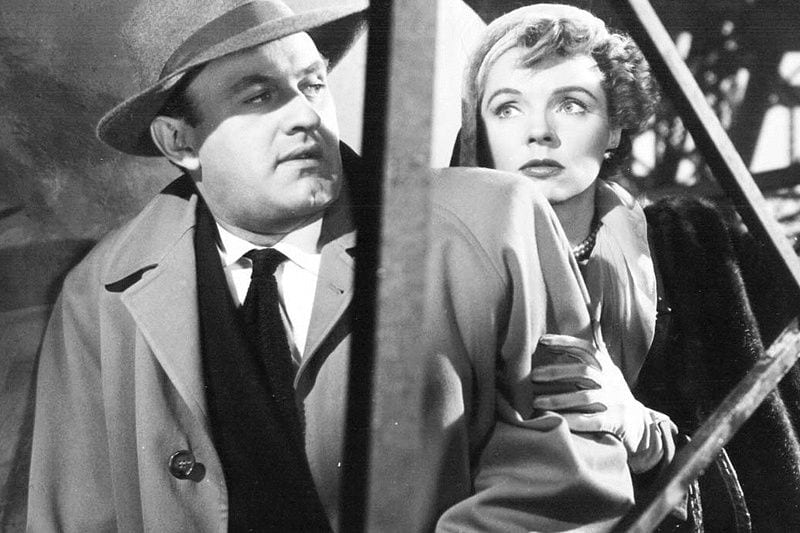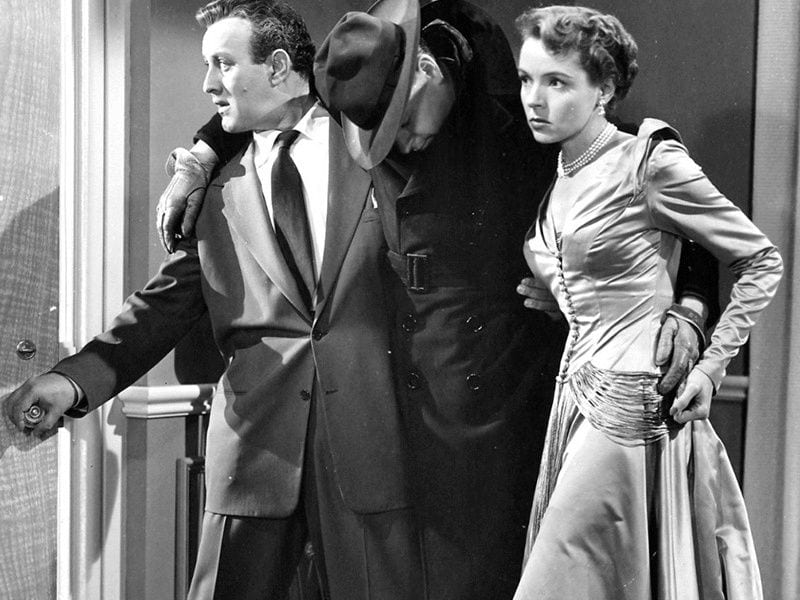
A low-budget independent production of 1950, Felix Feist’s The Man Who Cheated Himself is another fun example from the side streets and dead ends of film noir, now restored most impressively on this DVD/Blu-ray combo from Flicker Alley.
Credibility isn’t necessarily a virtue in this genre. The final proof of that is Alfred Hitchcock’s Vertigo (1958), a film whose story makes not a lick of sense from any angle. That’s not an idle comparison, because Feist’s film is also set in San Francisco and contains several shots that will give Vertigo fans a sense, if not exactly of vertigo, certainly of déjà vu, even though it was made eight years earlier.
Here’s the set-up. A man’s hands unwrap a revolver from a suitcase. His actions are decidedly suspicious, and include jimmying open the lock on a French door and tossing papers into the fireplace. One of the papers flutters to the floor, unnoticed by him. This unseen movement echoes an even more ominously fluttering, seemingly innocent object during the climactic setpiece, but of course we don’t know that yet.
After a hammering on the locked door, it becomes clear we are witnessing a married couple in the middle of an acrimonious split. He’s Howard Frazer (Harlan Warde), and his brittle and lacquered socialite wife, who clearly has the money, is Lois (Jane Wyatt). She’s getting rid of him amid mutual recriminations of infidelity. She’s tired of him after three years, and he’s heading for the airport. Then amid her pacing and massaging of her forehead, she notices the piece of paper on the floor: a receipt for the revolver. She instantly grasps that a murder plot is afoot, and she rushes to the phone to call someone.
That someone is, in fact, her adulterous boyfriend: Lt. Edward Cullen of the San Francisco homicide squad. He’s played by Lee J. Cobb, who had just won a Tony for his Broadway performance in Arthur Miller’s Death of a Salesman, a point played up in this film’s trailer. A stocky, internalized actor, he observes with detachment the mannered overacting of the two characters he interacts with most, and it’s as though he underplays to balance them. In his role, Lt. Cullen seems to be evaluating their performances while being required to do the most acting himself as the just-the-facts detective.
He doesn’t answer the phone. It’s picked up by his brother Andy (John Dall), a tall grinning guy who’s about to marry Janet (Lisa Howard, wife of director Feist), a bohemian commercial artist who lives in a studio designed in fabulous diagonals by art director Van Nest Polglase. Andy has just been transferred to homicide to share an office with his big brother, which is even odder when you consider that they also share an apartment and a bedroom. There really must be a housing shortage in San Francisco.
Lois doesn’t want to talk to Andy and hangs up the phone. Andy twigs that it’s one of his brother’s girlfriends, the kind who are invariably “bad for him”. He’s right, and when Ed goes to Lois’ fancy mansion where she’s in a state of near-hysteria, he ends up witnessing an incident where she plugs her husband (twice), who has sneaked home from the airport after providing himself an alibi to kill his wife.
This is the moment when any rational person would call an attorney and rely on the eyewitness testimony of a professional detective. Calling the police is Lois’ impulse. But we’ve learned that people in these scenarios go “blood simple”, or perhaps they really go “plot simple”, so Ed declares “The truth will get you 20 years,” and spontaneously volunteers to drop the corpse at the airport. In other words, this is the initial development we must swallow without thinking too hard about it, or else the rest of the story can’t go to hell in a hand basket so entertainingly.
If Ed has an Achilles’ heel, and he might have on both feet, it’s not just that he’s crazy for a woman he knows will drop him at her bored convenience. It’s really that, as a professional seen-it-all flatfoot, he believes he can orchestrate his way out of the kind of situation where he’s seen a thousand fools flounder. As an insider, he can deflect his brother’s eager-beaver conclusions and arguments, he can bide his time and throw up dust.
Of course, it all starts going south right away, thanks to unanticipated witnesses and coincidences and misdirections that are par for this type of course. Let’s just say a bunch of stuff happens in 80 minutes on the way to a beautifully modulated, even ambiguous ending. For a movie that begins with people behaving melodramatically, the ultimate avoidance of melodrama becomes one of the film’s memorable strengths.
Although distributed by 20th Century-Fox, this item was produced independently by Jack M. Warner, the son of Warner Brothers’ Jack Warner. Efficient B-director Felix E. Feist knocked it out on time and on budget with lots of attractive location shooting handled with deep-focus visual flair by superb photographer Russell Harlan. As shown in a bonus then-and-now feature on the San Francisco locations, at least three shots use the same highly noticeable locales and the same camera approach that Hitchcock would use in Vertigo, which makes us wonder if he saw this film. Although most of the driving shots use rear projection, as was standard at the time, one felicitous shot places the camera in a moving vehicle that swings across an intersection when Dall’s character runs a stop sign.
Dall made this film right after starring in Joseph H. Lewis’ groundbreaking outlaw-on-the-run noir Gun Crazy (1950), which had remarkable moments of fluid handheld camerawork, most famously in the back of a car. It’s thrilling to see classic cinematographers breaking out of the studio and feeling their oats during this period.
Dall was also known for starring in Hitchcock’s sublimated homosexual thriller Rope two years earlier, and for making his Oscar-nominated debut in Irving Rapper’s The Corn Is Green (1945), in which his character gets a woman pregnant out of wedlock and neither of them suffer for it; there was a war on. Here, the closeted Dall overacts the hearty bridegroom routine almost as much as Wyatt, best known as the super-housewife of TV’s Father Knows Best and then as Spock’s mother in the Star Trek series, sometimes overplays the femme fatale, and again, both are continually reigned in and balanced by Cobb’s nuanced bemusement.
The Man Who Cheated Himself won’t be taken for an important milestone of its genre and doesn’t need to be. Within the limitations of this sort of tightly wound melodrama, it delivers an entertaining morsel sure to please fans of noir and postwar unease. These are movies about how human impulses make everything unravel, and they leave an impression of both fragility and fatal inflexibility.
Previously a public-domain eyesore, circulating copies of this film have looked and sounded muddy. This restoration by theUCLA Film & Television Archive for the Film Noir Foundation never looks short of shot-yesterday terrific. The most significant extra is a short appreciation that interviews several historians and Feist’s son.


